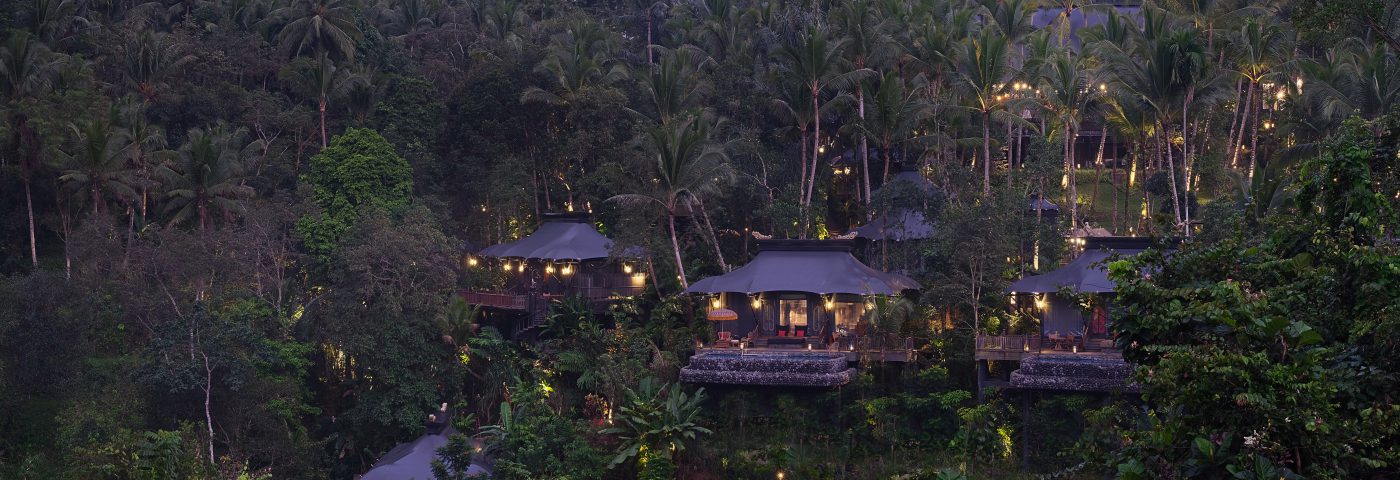Today’s young brands are often crudely split into two camps – those that are synonymous with timeless luxury, and those that are achingly cool and cutting edge. It is a rare kind of brand that manages to achieve the double feat of being both at the same time. Meet Capella…
The Capella Ubud sits in the travel world’s imagination as a by-word for elegance and sophistication, yet, to the casual onlooker, it resembles a modish tented commune, where an ethos of environmental consciousness exists effortlessly alongside its luxurious design. Nicholas Clayton is the man behind one of luxury’s most talked about brands…
Bill Bensley spoke at ILTM Asia Pacific recently about Capella Ubud and the superhuman lengths you went to to respect the local environment. How important is this for Capella?
Working with and supporting the local community is at the core of what we do. Capella Ubud is a fantastic example: In the design of this property minimal invasive site preparation was decided from the beginning, and all trees and local plants were left untouched and protected throughout the construction process. Not a single tree was cut during the camp’s creation, and as such, several trees are intercepting the property’s accommodation, restaurants and the spa tents. This is true of the way we work with all our hotels; recognising the importance of culture and the local context, each property sits in harmony with its environment.
We recruit colleagues and our leader base from the local communities in which we operate and collaborate with great architects, like Bill Bensley, interior designers, chefs and artists who embrace and champion our way of working.
Capella’s locations are predominantly in Asia, why are you focusing your expansion here?
Our roots are in Asia as Capella Singapore was the first property in the region. We intentionally set out to provide a new level of personalised service where the guests were engaged as ‘co-creators’ to curate experiences they desire and we would do everything to facilitate. After more than ten years of having just one Capella hotel on the continent, we set a milestone goal to undertake an aggressive expansion across the Asia-Pacific region. We will soon have a Capella hotel in Bangkok, the Maldives and Sydney, in addition to the ones now open in Sanya, Ubud, Shanghai and Singapore – each in their own right unique and successful. Opening these properties in the biggest populous centre of the world, Asia, is a gamechanger in amplifying the Capella brand and make us a very sought-after hotel group.
Our journey to grow the prominence of the brand doesn’t stop here, there are many opportunities we are looking into. On the radar are Beijing and Hong Kong and countries such as the Taipei, Laos, Cambodia, Myanmar, plus emerging tourism markets like Bhutan and Tibet. We are fairly young in our development and it is feasible to see 25 hotels under the Capella brand in the next 5 years, the challenge is finding the right locations where our vision of properties sitting in harmony with environment and curation of culture through meaningful experience can be fully realised.
Capella is a brand that often comes up in conversation when talking about ‘new luxury’, what does that mean to you?
An emergent type of traveller is coming to the fore; one who desires self-reflection and enrichment in their travels, to connect with humanity through the local community and the natural kingdom through conservation efforts, ultimately with the goal to return home more enlightened. The response to this is today’s hospitality brands look less like a way of travel and more like a way of life. And the market is shifting where experiences and knowledge are more significant than material or superficial manifestations of luxury.
What’s the most important issue in luxury hospitality now and what can we expect from the future?
The most important issue in luxury hospitality for travellers now is sustainability. More and more customers are aware of sustainability issues concerning the travel industry. As the Capella brand continues its expansion, we have sharpened our commitment to sustainability with several initiatives in place to ensure environmental protection. An example is Capella Ubud which has an onsite organic garden, crayfish farm, and beehives – in addition to the garden being used for menu preparations within the camp, there are plans to expand the garden to enable the local villagers to sell goods and benefit from the proceeds. In line with their dedication to supporting local village residents, the property also has a scholarship programme whereby they teach children a hospitality-related skill and offer English classes, and instead of monetary repayment, Capella Ubud asks students to “pay” by bringing a bag of empty plastic bottles to each class. The team recycles the plastic bottles with all proceeds reinvested in the village.
What do you think about the rise of conscious travel and whether the role of the travel industry is changing in the lives of the people we serve?
The travel industry is rising to fill the need of mindful travellers who want more conscious travel experiences that enrich their lives and those of the people in the locales they travel. No longer satisfied with a typical luxury hotel experience, luxury travellers are now looking to give back as much as they get out of travel. According to research from OnePoll on behalf of Exodus Travels: 78% of travellers define themselves as more “ethically conscious” than they were a decade ago. Conscious travel has lit a fire under multiple travel brands to go beyond the everyday and see travel as more than a form of escape – by moving away from the humdrum experiences of substance can be created which have a positive impact on the world we live.


